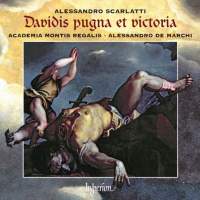
Fine-honed Skill
Alessandro Scarlatti's
'Davidis pugna et victoria' -
heard by
ROBERT ANDERSON'Alessandro de Marchi has done admirably ...'
|

|
Perhaps it is no bad thing that the librettist of this Latin oratorio remains anonymous. Except for a superb line of Virgil filched for the dying Goliath, the text subscribes mainly to a dog-Latin that veers occasionally towards a puppy version of the language. It is no wonder that the English translation can be described as only approximate. But at least we know that the work, though perhaps written earlier, was performed on the second Friday in Lent, 1700. It deals swiftly with a biblical narrative that spreads over more than one chapter in the first book of Samuel.
The Narrator paints at once the blackest picture of Israel's mood and that of King Saul. The mere sight of Goliath has the Jewish leader trembling with fright. Nothing his son Jonathan can say lifts his despair, and the arrival of David is greeted with scorn. After telling the young man to depart, Saul is silent and invisible for the rest of the work. Jonathan and David are bosom friends earlier than in the Bible, but Jonathan too has performed his function by the end of Part 1. It is then left to David and Goliath to settle the issue of the day and for the Israelis to celebrate the outcome.
Scarlatti's orchestral forces follow the pattern of a concerto grosso, with string ritornellos (plus divided violas) to accompany and punctuate the weightier moments of the drama, and concertino or continuo alone to support the fleeter passages. It is a relief that Scarlatti makes little use in the work of the da capo aria that was to induce so many yawns during the eighteenth century. He prefers strophic forms, and has recourse also to the tried security of a ground bass. The cast is entirely male, but if David and Jonathan have to be sopranos, so be it.
Father Saul and son Jonathan demonstrate their contrasting attitudes in a tiny duet, the one calling for flight, the other battle. Previously Jonathan had invoked hope in a couple of stanzas that almost recall the nonsense verse of Edward Lear.
Listen -- Iam veni tu spes (Part 1)
(track 10, 0:00-0:41) © 2009 Hyperion Records Ltd
Jonathan's good cheer has no effect on his father, who remains in the dumps, though touchingly so, comparing his dismal predicament with that of a withering red rose.
Listen -- Mea fata, superbi, vedete (Part 1)
(track 12, 0:09-1:19) © 2009 Hyperion Records Ltd
By the end his spirit is broken: 'I give in, I yield, I retreat.' Nor can the Israeli chorus do other than prudently follow their leader's example, assuming the whole venture was undertaken under the worst of omens.
Listen -- Eamus, fugiamus (Part 1)
(track 14, 1:53-2:51) © 2009 Hyperion Records Ltd
Antonio Abete's loud-roaring Goliath brandishes his weapons, grinds his teeth like a lion, and calls on the Philistines to conjure the demons of hell.
Listen -- Ad arma (Part 2)
(track 32, 0:42-1:21) © 2009 Hyperion Records Ltd
By contrast David responds calmly and thoughtfully with a continuo aria of rare contemplative beauty.
Listen -- Tu mihi superum aeterne rex (Part 2)
(track 33, 0:00-1:31) © 2009 Hyperion Records Ltd
It remains for Frederik Akselberg as the tenor narrator to describe David's felling Goliath by means of a stone from his sling, all six cubits and a span of him, so that Virgil can speed his life to the shades below.
Listen -- Dixit, et excusso montano (Part 2)
(track 34, 0:09-0:29) © 2009 Hyperion Records Ltd
Roberta Invernizzi, Robin Johannsen and Martin Oro characterise their music with fine-honed skill as David, Jonathan and Saul. Which particular mount is commemorated by the Academia Montis Regalis I do not know, but the team and its period instruments deliver their eloquent message from somewhere near its summit, while the full-voiced choir is appropriately doleful or triumphant on behalf of both Israelis and Philistines. Alessandro de Marchi has done admirably by Scarlatti and hyperion in a neglected work that deserves the best.
Copyright © 25 November 2009
Robert Anderson,
Cairo, Egypt
 CD INFORMATION: DAVIDIS PUGNA ET VICTORIA
CD INFORMATION: DAVIDIS PUGNA ET VICTORIA
| 
